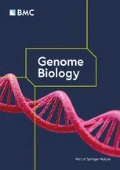The flagellum, the organelle that enables bacteria to swim, consists of a long, thin filament that is rotated at hundreds of revolutions per second by a motor embedded in the cell surface. The filament is essentially a tube made up of 11 protofilaments arranged as a helical supercoil. By switching between left- and right-handed helical twists (the L and R states, respectively), a bacterium can switch between 'running' and 'tumbling' (reorientating) motions. In the 15 March Nature, a team led by Keiichi Namba of the Protonic NanoMachine Project and Matsushita Electric Industrial Company, Kyoto, Japan, provides an insight into how filaments are able to switch helical states (Nature 2001, 410:331-337).
Each protofilament contains thousands of copies of the protein flagellin, aligned one of top of another. Namba and colleagues crystallized the protein and analyzed its structure at atomic (2Å) resolution. Flagellins of both the L and R states crystallized only into the R state. To simulate the slightly longer L protofilament, the authors used a computer program to gradually stretch their R-type protofilament images. At one point, an abrupt change in conformation was seen in a local feature of the structure. Samatey et al. suggest that this may be the key event in switching.
This molecular switching mechanism will be of interest to nanotechnologists who are trying to develop tiny propeller-driven biomolecular devices that could move around the body repairing cells and dispensing drugs.
References
Samatey FA, Imada K, Nagashima S, Vondervist F, Kumasaka T, Yamamoto M, Namba K: Structure of the bacterial flagellar protofilament and implications for a switch for supercoiling. Nature 2001, 410:331-337., [http://www.nature.com/nature/]
Protonic NanoMachine Project, [http://www.jst.go.jp/erato/project/npnm_P/npnm_P.html]
Rights and permissions
About this article
Cite this article
Lee, K. Structure of a biological propeller. Genome Biol 2, spotlight-20010316-02 (2001). https://doi.org/10.1186/gb-spotlight-20010316-02
Published:
DOI: https://doi.org/10.1186/gb-spotlight-20010316-02

